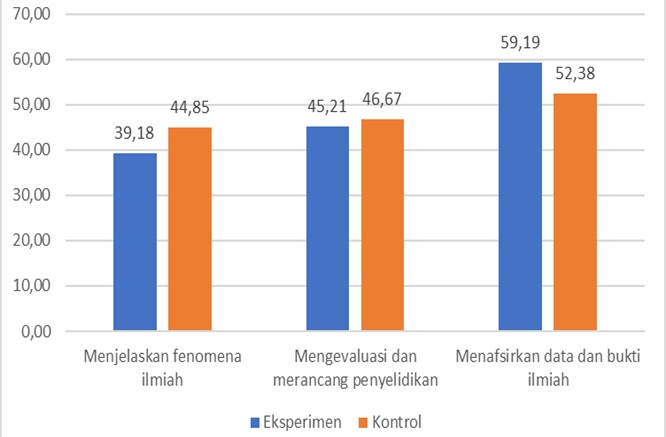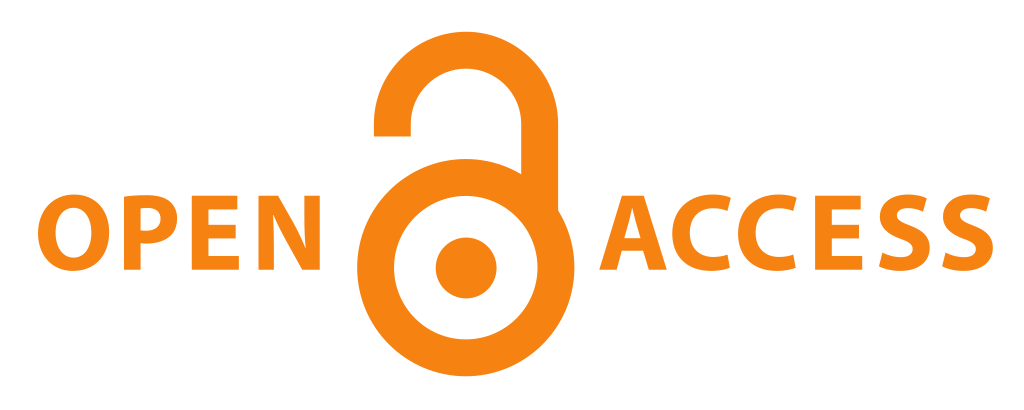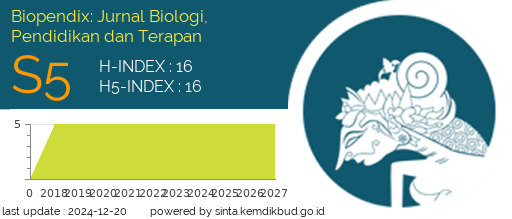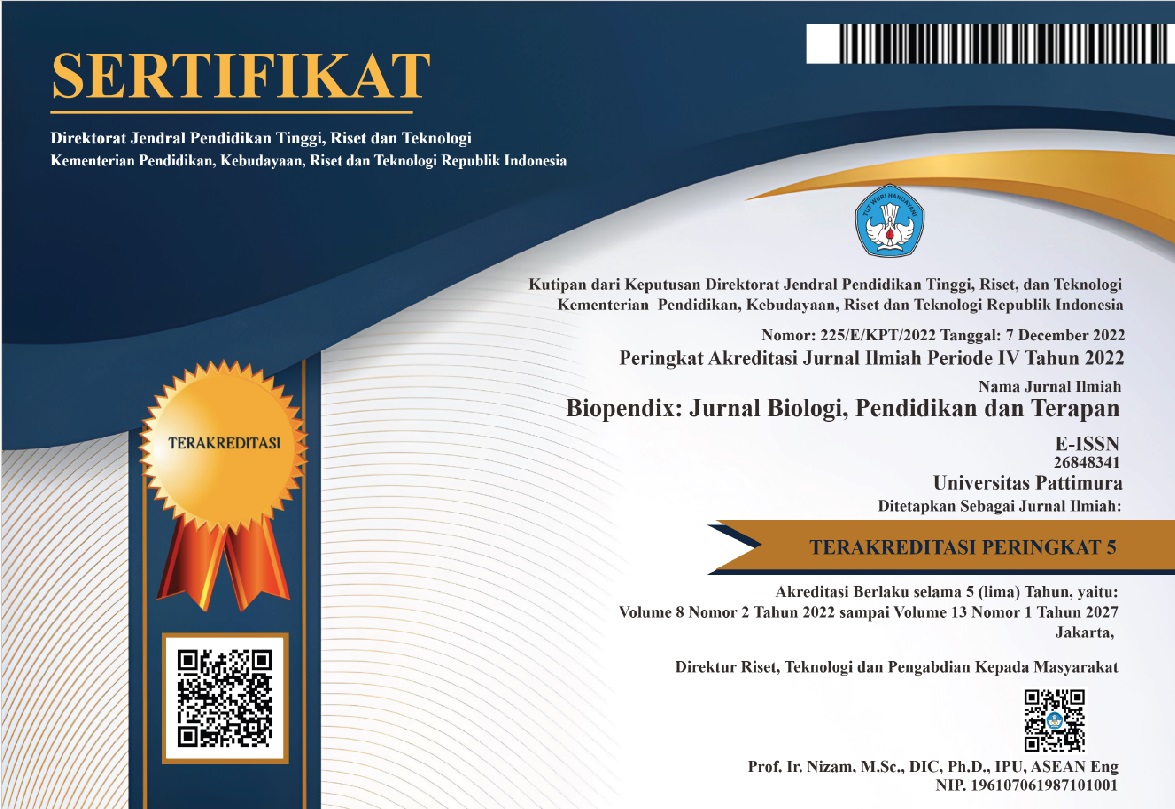THE EFFECT of The PROBLEM BASED LEARNING (PBL) MODEL on STUDENTS’ SCIENCE LITERACY SKILLS on INDONESIA’S ECOLOGY and BIODIVERSITY MATERIALS
Abstract
Background: Science literacy is the capacity to use clinical information to pick out troubles and draw conclusions based totally on proof so that you can understand and make selections approximately nature and modifications made to nature via human activities. Based on PISA data and preliminary study data, the literacy of science competencies of Indonesian students is still low. One of the learnings that has a positive influence on science literacy is problem-based learning (PBL).
Methods: This study applied the Quasi Experiment method with the Nonequivalent Control Group Design. This research was conducted at SMPN 1 Gunung Talang, Solok Regency, West Sumatra in class VII in the 2023/2024 school year.
Results: The average value of the experimental class is higher than the average of the control class on the posttest data. The hypothesis test results show that t'count 3.372 is greater than t'table 2.008, so H0 is rejected and H1 is accepted.
Conclusion: The application of the Problem Based Learning (PBL) model affects the science literacy skills of students in Indonesian Ecology and Biodiversity material.
Downloads
References
Amira Vashti, T., Hairida, & Hadi, L. (2020). Deskripsi Literasi Sains Mata Pelajaran Ilmu Pengetahuan Alam Siswa Smp Negeri Pontianak. Educhem, 1(2), 38–49.
Ardianti, R., Sujarwanto, E., & Surahman, E. (2022). Problem-based Learning: Apa dan Bagaimana. Diffraction, 3(1), 27–35. https://doi.org/10.37058/diffraction.v3i1.4416
Ardianto, D., & Rubini, B. (2016). Comparison of students’ scientific literacy in integrated science learning through model of guided discovery and problem based learning. Jurnal Pendidikan IPA Indonesia, 5(1), 31–37. https://doi.org/10.15294/jpii.v5i1.5786
Arends, R. I. (2012). Learning to Teach. New York: Mc Graw Hill.
Asriningtyas, A. N., Kristin, F., & Anugraheni, I. (2018). Penerapan Model Pembelajaran Problem Based Learning untuk Meningkatkan Hasil Belajar dan Kemampuan Berpikir Kritis Matematika pada Siswa Kelas IV Sekolah Dasar. JIIP - Jurnal Ilmiah Ilmu Pendidikan, 6(12), 9978–9985. https://doi.org/10.54371/jiip.v6i12.2495
Astuti, T. P. (2019). .Model Problem Based Learning dengan Mind Mapping dalam Pembelajaran IPA Abad 21. Proceeding of Biology Education, 3(1), 64–73. https://doi.org/https://doi.org/10.21009/pbe.3-1.9
Britt, M. A., Richter, T., & Rouet, J. F. (2014). Scientific Literacy: The Role of Goal-Directed Reading and Evaluation in Understanding Scientific Information. Educational Psychologist, 49(2), 104–122. https://doi.org/10.1080/00461520.2014.916217
Fauziah, N., Hakim, A., & Handayani, Y. (2019). Meningkatkan Literasi Sains Peserta Didik Melalui Pembelajaran Berbasis Masalah Berorientasi Green Chemistry Pada Materi Laju Reaksi. Jurnal Pijar Mipa, 14(2), 31–35. https://doi.org/10.29303/jpm.v14i2.1203
Fortus, D., Lin, J., Neumann, K., & Sadler, T. D. (2022). The role of affect in science literacy for all. International Journal of Science Education, 44(4), 535–555. https://doi.org/10.1080/09500693.2022.2036384
Hasasiyah, S. H., Hutomo, B. A., Subali, B., & Marwoto, P. (2019). Analisis Kemampuan Literasi Sains Siswa SMP pada Materi Sirkulasi Darah. Jurnal Penelitian Pendidikan IPA, 6(1), 5. https://doi.org/10.29303/jppipa.v6i1.193
Klemenčič, E., Virtič, M. P., & Kovačič, J. M. (2023). The Role of Teacher Education in the Science Literacy Development. Athens Journal of Education, 10(4), 647–668. https://doi.org/10.30958/aje.10-4-5
Lendeon, G. R., & Poluakan, C. (2022). Pengaruh Model Problem Based Learning (PBL) Terhadap Kemampuan Literasi Sains Siswa. SCIENING : Science Learning Journal, 3(1), 14–21. https://doi.org/10.53682/slj.v3i1.1076
Lestari, N. P. C. (2018). Penerapan Model Pembelajaran Kooperatif Tipe Nht Berbantuan Media Audio Visual Untuk Meningkatkan Hasil Belajar IPA. Journal of Education Action Research, 2(4), 355. https://doi.org/10.23887/jear.v2i4.16331
Nuzula, N. F., & Sudibyo, E. (2022). Penerapan Model Problem Based Learning untuk Meningkatkan Kemampuan Literasi Sains Siswa SMP pada Pembelajaran IPA. Jurnal : Pendidikan Sains, 10(3), 360–366. https://ejournal.unesa.ac.id/index.php/pensa
OECD. (2018). PISA: Vol. IV. PISA. https://doi.org/https://doi.org/10.1787/48ebd1ba-en.
OECD. (2019). Pendidikan di Indonesia Belajar dari Hasil PISA 2018. Pusat Penilaian Pendidikan Balitbang Kemendikbud, 021, 1–206.
Purwanto, N. (2012). Prinsip-Prinsip dan Teknik Evaluasi Pengajaran. PT. Remaja Rosdakarya.
Turiman, P., Omar, J., Daud, A. M., & Osman, K. (2012). Fostering the 21st Century Skills through Scientific Literacy and Science Process Skills. Procedia - Social and Behavioral Sciences, 59, 110–116. https://doi.org/10.1016/j.sbspro.2012.09.253
Yanto, F., & Enjoni, A. (2022). The effectiveness of the problem-based learning model to improve the students’ 21 st century skills. Indonesian Research Journal in Education, 6(2), 232–242.
Yulianti, Y. (2017). Literasi Sains dalam Pembelajaran IPA. Prosiding SNFA (Seminar Nasional Fisika Dan Aplikasinya), 2(2), 257. https://doi.org/10.20961/prosidingsnfa.v2i0.16408

Copyright (c) 2024 Junita Fatmawati

This work is licensed under a Creative Commons Attribution-ShareAlike 4.0 International License.
Authors who publish with this Journal agree to the following terms:
- Author retain copyright and grant the journal right of first publication with the work simultaneously licensed under a creative commons attribution license that allow others to share the work within an acknowledgement of the work’s authorship and initial publication of this journal.
- Authors are able to enter into separate, additional contractual arrangement for the non-exclusive distribution of the journal’s published version of the work (e.g. acknowledgement of its initial publication in this journal).
- Authors are permitted and encouraged to post their work online (e.g. in institutional repositories or on their websites) prior to and during the submission process, as it can lead to productive exchanges, as well as earlier and greater citation of published works




 2
2






